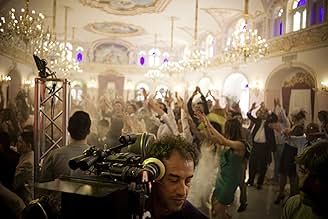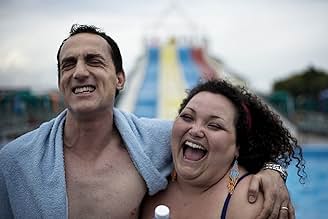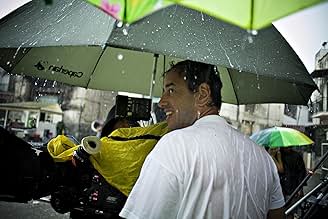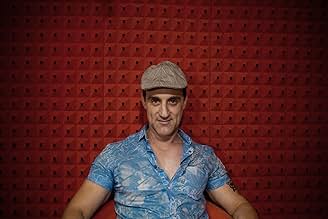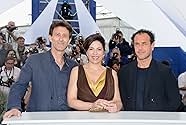Luciano is a charming fishmonger whose unexpected and sudden obsession with being a contestant on a reality show leads him down a rabbit hole of skewed perceptions and paranoia.Luciano is a charming fishmonger whose unexpected and sudden obsession with being a contestant on a reality show leads him down a rabbit hole of skewed perceptions and paranoia.Luciano is a charming fishmonger whose unexpected and sudden obsession with being a contestant on a reality show leads him down a rabbit hole of skewed perceptions and paranoia.
- Awards
- 12 wins & 19 nominations total
Featured reviews
When I started watching this movie I thought "Well, the director is Garrone and the movie is set in Naples, so it must be a copy of Gomorrah or something like that". Instead I was surprised of how Garrone nicely brought up another aspect of Naples and its inhabitants. The setting is a poor neighborhood in the Italian port city and the main character is Luciano, a fishmonger and father of two children. His daily life is ordinary and uneventful and he struggles to earn money through his first job and his second one which consists in cheating people by selling them some cleaning devices. Everything could change when he has the opportunity to participate to the Big Brother rehearsals where he can exploit his qualities as entertainer. His certainty of making it to the show is so strong that he becomes paranoid about people of the Big Brother casting staff spying on him to see if he's really a character as he claims to be in everyday life. He does many crazy things like selling his fishmonger activity and doling out his personal belongings to poor people in order to impress the alleged casting personnel following him. His mental condition soon worsens and develops into craziness which of course affects inevitably his family life. What I liked best about this movie is how Garrone underlines how miserable everyday life can be and how everyone is in search of the big opportunity to get out of misery. This however can lead to ruining personal and family life. I also appreciated how the director shows how some feelings and actions can be so evidently false as that of Luciano of being overly generous with poor people only for personal purposes. One last thing I would like to mark is Garrone's style of shooting, which was quite like that of Gomorrah, that's very simple and with seemingly amateur close shootings. Compared to Gomorrah however I would say that he wanted to give a more dreamy touch and also something Fellinesque: in one scene Luciano comes back home from the Big Brother rehearsal in Rome and, in the beautifully lit neighborhood, he's welcomed by his neighbors as a hero. In the next scene the neighborhood is showed in daytime during its normal daily activity, presenting all its simplicity and misery. Therefore an evident contrast is shown between dream and reality.
I learned of Matteo Garrone from his 2015 movie "Tale of Tales", an unusual spin on fairy tales. It turned out that he had earlier directed 2012's "Reality". The movie is part focus on Italy's working-class population, part indictment of reality TV's exploitation of "real people". The plot involves a fishmonger who gets chosen for a role on a reality show.
I should note that if you're only used to stereotypical Hollywood movies, then you'll want to avoid this one like the coronavirus. Much of the movie consists of long takes, focusing very much on the dialog. A good thing, if you ask me. I would like to see more movies about people and the modern world's impact on them.
I don't know if I would go so far as to call the movie a masterpiece, but it shows the Italy that exists beyond the fashion shows, bike races, etc. Worth seeing.
I should note that if you're only used to stereotypical Hollywood movies, then you'll want to avoid this one like the coronavirus. Much of the movie consists of long takes, focusing very much on the dialog. A good thing, if you ask me. I would like to see more movies about people and the modern world's impact on them.
I don't know if I would go so far as to call the movie a masterpiece, but it shows the Italy that exists beyond the fashion shows, bike races, etc. Worth seeing.
Garrone's magical movie opens with bows to two great scenes of Italian cinema: the ornate wedding carriage recalls the child's funeral procession from The Gold of Naples, and the helicopter-borne star of a reality show replays the helicopter ride of Jesus in La Dolce Vita. These images evoke Italy as the longest-running "society of the spectacle": Roman games; Renaissance princes and popes who conned everyone, as Machiavelli says; the splendors of the Counter-Reformation Church; and media mogul Silvio Berlusconi with the sun in his pocket-"il sole in tasca."
Luciano--fish monger, petty con artist, and pater familias--longs to be cast in a reality show called Big Brother. His quest becomes increasingly obsessive and fantasmagoric, and his extended family shifts from humorous support to escalating concern. Will his dream come true?
Aniello Arena in the part of Luciano is terrific and will capture your heart; he has a surprising and poignant story of his own, which you can check online for yourselves. Garrone is a master of production design, creating exuberant post-modern sets in which decaying Neapolitan palazzi mingle with malls and water slides. This movie is perhaps not for everyone-only for those prepared to enter a world that is theatrical, flamboyant, sentimental, and ironic--one that calls for a sense of humor and a big heart.
One of the things I have read more frequently about this movie is that, since it talks about the TV program "Big Brother", which in Italy has already reached the 12th season, it's supposed to be a decade late. Well: it's not, as the "Reality" mentioned in the title is obviously not the one of the TV-genre, but the actual one of nowadays Italy.
As Woody Allen wrote once, "life doesn't imitates art: imitates bad television". Following this line, the first scene is by far the more "fantastic" of the whole movie: we see an incredibly rich marriage ceremony, and we are not on TV or in any other fiction, but we are supposed to be in the real world - even if the settings and the outfits looks like a David LaChappelle picture. But later, when the guests go back to their homes, we see how theirs everyday "Reality" is made of poor dirty houses, impossibly crowded interiors, daily struggles and tricks to arrange a living. All places depicted completely lack any sign of awareness or responsible living in the world: newspapers don't exist, books are never read or shown, Internet is never searched – and receipts during commercial transactions are never issued. In this wasteland of culture and decency, feelings still grows. We can see that the main character still genuinely loves and cares for his wife and kids, and he could be called, in his own way, a good family man. But disaster suddenly happens when his set of values proves to be not enough to properly relate with the ghosts of fame and success.
This "Bigbrother" thing, when it was introduced in Italy had some cultural appeal, and for some months represented something worthy to talk about. But it has quickly evolved in a tire and sad repetition of the same situations, that seems to aim at a lower target every further year: and after more than 10 years of lowering, now it doesn't have audiences anymore, but victims. This movie will show you how one of those victims undergoes his own sacrifice. So, be prepared: it can't be anything else than a very sad story – highlighted anyhow by some great actor performances.
As Woody Allen wrote once, "life doesn't imitates art: imitates bad television". Following this line, the first scene is by far the more "fantastic" of the whole movie: we see an incredibly rich marriage ceremony, and we are not on TV or in any other fiction, but we are supposed to be in the real world - even if the settings and the outfits looks like a David LaChappelle picture. But later, when the guests go back to their homes, we see how theirs everyday "Reality" is made of poor dirty houses, impossibly crowded interiors, daily struggles and tricks to arrange a living. All places depicted completely lack any sign of awareness or responsible living in the world: newspapers don't exist, books are never read or shown, Internet is never searched – and receipts during commercial transactions are never issued. In this wasteland of culture and decency, feelings still grows. We can see that the main character still genuinely loves and cares for his wife and kids, and he could be called, in his own way, a good family man. But disaster suddenly happens when his set of values proves to be not enough to properly relate with the ghosts of fame and success.
This "Bigbrother" thing, when it was introduced in Italy had some cultural appeal, and for some months represented something worthy to talk about. But it has quickly evolved in a tire and sad repetition of the same situations, that seems to aim at a lower target every further year: and after more than 10 years of lowering, now it doesn't have audiences anymore, but victims. This movie will show you how one of those victims undergoes his own sacrifice. So, be prepared: it can't be anything else than a very sad story – highlighted anyhow by some great actor performances.
Did you know
- TriviaAniello Arena, the lead actor, served nearly 30 years in prison for murder and was on parole when "Reality" was filmed.
- ConnectionsFeatured in At the Movies: Episode #10.21 (2013)
- How long is Reality?Powered by Alexa
Details
Box office
- Gross US & Canada
- $72,577
- Opening weekend US & Canada
- $7,072
- Mar 17, 2013
- Gross worldwide
- $3,350,996
- Runtime1 hour 56 minutes
- Color
- Sound mix
- Aspect ratio
- 2.39:1
Contribute to this page
Suggest an edit or add missing content


